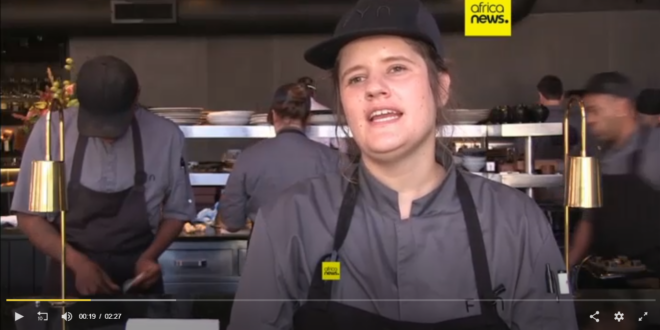Muhamad Yehia.. Cairo
Here at FYN attention to detail is everything, not just the food on the plate, but every aspect of the business.
The restaurant in Cape Town’s city centre is the first on the African continent to be given the Sustainable Restaurant Association’s highest accolade – 3 stars for its Food Made Good Standard rating.
FYN places importance on serving food which is endemic to the Cape
The name FYN is a play on the region’s fynbos, an area of land with unique plant and animal species, fynbos itself means fine bush.
It’s also a play on the fact that it’s a fine dining restaurant.
Set menus for lunch or dinner vary between R1575 and R2175 (US$80 to US$110).
To achieve its three star sustainability rating the restaurant was assessed on its sourcing, working environment and its ecological impact
The UN says carbon emissions from food systems need to be addressed by minimising wastage, improving recycling, and sourcing local products instead of imported products.
It says food loss is largely due to South Africa’s poorly integrated food chain which generates waste in almost every phase of production.
Executive Chef Bea Malherbe explains what FYN’s cuisine is a taste of the Far East using southern African ingredients.
“The food style at FYN is a mix of South African ingredients, ingredients that are true to the area whether it’s our seafood, our game, our vegetables, that we cook, and execute with a Japanese twist, using techniques that Japanese cuisine will use,” she explains.
The UN defines sustainability as meeting the needs of the present without compromising the ability of future generations to meet their own needs.
FYN sources much of its ingredients from an indigenous garden at Buitenverwachting wine estate in Cape Town.
For FYN Chef Patron Peter Templehoff, working with local ingredients offers new creative possibilities in the kitchen.
He uses local plants such as prenia in his dishes that are not typically used in cooking and claims they are undesirable by people, wildlife and pests.
He says: “Indigenes are water-wise, they’re delicious, they grow like mad in this environment. And they’re not eaten by pests and baboons, and pests, and like insects, and even humans. They’re a great source of vitamins and nutrients and it’s kind of a no-brainer to also be cooking, in particular as a restauranteur and a chef, to be cooking with something unique, unique to the region, and something I’ve never cooked with before is incredible.”
Another source of ingredients for FYN restaurant is seafood delivered regularly by non profit organisation Abalobi Fish.
Abalobi works with small-scale fishermen and provide data which verifies local catches.
The company also aims to build markets for more resilient fish stocks such as the abundant Cape Bream.
Introducing a cold chain has helped small-scale producers significantly, says Hein Goliath from Abalobi.
“What we do is to distribute cooler boxes with ice to the fishers, and that creates the opportunity for the fish to be in a better quality. And I think because we address the quality issue, it becomes a product that restaurants can offer to their customers,” he explains.
The Cape Bream here is served with persimmon, jalapeno and kosho ponzu.
Also on the menu is Outeniqua Springbok with pine nut, local miso, roasted fig and prenia.
Food critic Steve Steinfeld is visiting as a guest of FYN.
“I’m really loving the interplay between Japanese technique and then South African ingredients. It’s super clever and it’s coming through really well in the menu. I really like the soutslaai with the almost sashimi like slices of yellowtail, and when it comes to the almost nigiri to then have that with some local, aged cheese is such an unexpected yet really refreshing and interesting pairing,” he says.
Part of hitting sustainability targets in a restaurant is waste management.
Creating compost from organic waste is one measure to stop waste going to landfill site and instead be recycled.
Don’t Waste is a waste management and minimisation company which oversees FYN’s recycling.
Enya Scharein from Don’t Waste says: “Food waste is the number one problem for restaurants and food and beverage businesses. So we will help them to separate that out at source and then find solutions for it. So we’re here at Evidently Green, where FYN restaurant’s food waste comes, so that it can be composted and valorised into a valuable product.”
Arabella Parkinson is a chef who consults with lodges and restaurants to draw up sustainable food strategies. She raises two concerns with the Food Made Good Standard rating.
“There’s no transparency in terms of the questions, the questionnaire that the restaurants get for the audit to understand their practices. I think there’s always room to, you know if there was a bit more transparency maybe it would also push other institutions to try and reach for those goals, and better their practices. Then the other thing is the price point can be quite a barrier for smaller institutions. So for the medium dining or the regular restaurant, it’s very hard for them to pay for that assessment and therefore kind of keeps them out of reaching for those sustainability goals.
Parkinson nonetheless believed FYN’s three star rating is a good achievement as it shows business success needn’t be exclusive to sustainable practice.
 موقع وجه أفريقيا موقع وجه أفريقيا هو موقع مهتم بمتابعة التطورات في القارة الأفريقية
موقع وجه أفريقيا موقع وجه أفريقيا هو موقع مهتم بمتابعة التطورات في القارة الأفريقية



